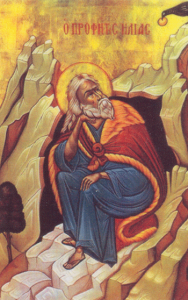The Prophet Elijah: Fire or Grace?

 Prophet Elias (public domain)
Prophet Elias (public domain)Today the Orthodox Church commemorates one of the great figures of the Old Testament: the prophet Elijah, or Elias. Since for the last couple years I regularly participated in the Vespers service at St. Elias Greek Orthodox Church in Dubuque I wanted to reflect a bit on their patron saint.
He is remembered as the “Prophet of Fire,” and that rings true to the stories told of him.
In his famous grudge match with the prophets of Baal, Elijah prayed and God sent fire from heaven to burn up a waterlogged sacrifice. (1 Kings 18:36-38)
On the mountain, waiting for God to pass by, after whirlwind and earthquake came fire. (1 Kings 19:11-12)
When King Ahaziah sent 50 soldiers to arrest him, Elijah called down fire from heaven to destroy them — twice. (2 Kings 1:9-12)
When his life on earth was over, God took him to heaven in a flaming chariot driven by flaming horses (2 Kings 2:11)
I suspect that those who model their ministry on the prophets like this kind of thing. Drama and power are intoxicating.
Perhaps the most interesting prayer of the service for the day goes another direction:
Seeing humanity’s great iniquity and God’s measureless love for humanity, Elias the Prophet was angry and troubled and spoke uncompassionate words to the compassionate God. “Vent Your wrath,” cried he, “on them who renounced You, O Judge most just.” But in no way did he move the heart of the Good to punish the ones who renounced Him. For He ever awaits the repentance of all, as the Lord who alone love humanity. (Ages Digital Chant Stand)
So there is another lesson to be drawn from Elijah — a message of grace.
Grace and compassion are embodied in other aspects of the prophet’s ministry, as when he ensured a widow had food in a time of famine, and raised her son from death. (1 Kings 17:8-24)
More importantly, you see grace and compassion in what Elijah received from God.
In that time of famine, God guided Elijah to a source of water, and directed ravens to bring him food. (1 Kings 17:1-6)
When the source of water failed, God directed the prophet to the widow and promised her grain and oil would not fail if she cared for Elijah. (1 Kings 17:7-9)
When he was afraid and depressed because the queen was seeking to kill him, God instructed Elijah to rest and provided him food and water until he was able to cope again (1 Kings 19:1-9)
And when Elijah, still pretty whimpery, complained that he was the only person left who loved God, God revealed that there were still 7000 faithful, and gave him Elisha for a servant. (1 Kings 19:13-21)
God’s tender care of Elisha is a constant feature of the text. God had called Elijah, and God provided every step of the way.
The fireworks and violence were not what the prophet chose. Those were just his strange direct instructions from God. They don’t come with a command to “Go and do likewise.”
But we can learn from the way God cared for Elijah. We too can learn to look for God’s grace and compassion all around us. We can be grateful.
That gracious compassion is something we can imitate. We can share it with others. If we go and do likewise our character will be more like God’s.
The post The Prophet Elijah: Fire or Grace? appeared first on Gary Neal Hansen.



